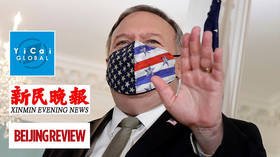US’ latest targeting of Chinese media to ‘curb propaganda’ is, in fact, propaganda in its purest form

Secretary of State Mike Pompeo has put new curbs on six Chinese media outlets in an apparent effort to stop the spread of misinformation. Who’s he trying to kid? This is anti-China propaganda in its most blatant form.
Yesterday, the US Department of State announced that it was designating six more Chinese media outlets as ‘foreign missions.’
The outlets – Yicai Global, Jiefang Daily, Xinmin Evening News, Social Sciences in China Press, Beijing Review and Economic Daily – now join frontline Chinese media companies such as China Global Television Network (CGTN), the Global Times, Xinhua and the China Daily under the designation, which treats the entities as diplomatic bodies and allows the US government to limit their properties and review their personnel.
Mike Pompeo stated that the decision was to ensure that American audiences knew the content provided by these outlets was “propaganda” by the “Chinese Communist Party.”
The move is the latest in a series of tit-for-tat actions between Washington and Beijing concerning each other’s media, which began when Pompeo demanded a number of Chinese journalists be expelled from the US earlier this year. China subsequently responded by sending home US correspondents based in Beijing.
This latest move is likely to result in further restrictions on US reporters in China. While such moves will be met with disdain as Chinese ‘attacks on the freedom of the press,’ it is important to understand who is responsible for this, and in turn to recognize that Chinese media outlets do not seriously represent a propaganda threat to the US. This is a convenient myth.
Also on rt.com Trump’s claim he’ll ‘make China pay’ is more pre-election saber-rattling… and he’ll up the ante even further over next three weeksWhat is propaganda? What does this term mean? In practical terms, propaganda refers to the act of an organization, body or government facilitating messaging which is designed to influence an audience towards taking a particular position.
If taken literally, it is a practice that is quite broad. Advertising may constitute propaganda, as can any form of government messaging. Yet this is not how the term is understood or portrayed in popular understanding.
Instead, ‘propaganda’ is commonly defined as a form of deception which is assumed to be the work of a group, country or organization that one doesn’t like. In politics, the term is only ever used to refer to ‘adversarial’ countries, and is often used as a catch-all dismissal to discard anything and everything they say.
In turn, one’s own ‘team’ never engages in the practice. When, for example, has the US government ever been accused of peddling ‘propaganda’ in mainstream discourse? Never, because the term is partisan, but this ignores overwhelming levels of deception from the American government that stem back decades.
As a result, the way this term is framed misleads us on China. Pompeo argues, as do many, that Chinese media constitutes ‘propaganda’, and therefore isn’t real journalism or entitled to a real voice. In doing so, he weaponizes broader narratives and insinuations that China is interfering in American politics and seeks to utilize ‘misinformation’ against the public.
Therefore, he argues, these outlets need to be restricted and shown for what they are. But in reality, this is nonsense. In practice, Chinese media outlets have minimal influence and very little traction in the US. What’s more, beyond issues related to China’s relationship with the US, such outlets do not take positions on matters pertaining to American domestic politics and nor do they, either directly or indirectly, endorse any candidates in elections.
Also on rt.com New American military base in Pacific would show how US-China cold war is heating up fastAs usual, it’s extremist Cold War hyperbole from Pompeo which seeks to play up China as an imminent global threat. But it just isn’t true. Indeed, one might question from this who is really pushing the propaganda?
Beyond that of course, the move will have obvious consequences for the US. In order to protect its own media in America, China will respond in kind, but also be careful not to escalate further. Usually this has involved the expulsion of American journalists from its territory, or as a softer measure freezing the credentials for new ones.
Or alternatively, given Pompeo has been unleashing new measures against China on an almost weekly basis for several months now in the run-up to the election, Beijing may simply bide its time rather than adding more fuel to the fire.
President Trump’s administration has a habit of insisting that it must have the last word or action in any confrontation, and is not afraid to escalate situations in abrasive ways to show how ‘tough’ it really is. As a result, Beijing may be better waiting rather than creating a media standoff before the polls, which would, of course, only benefit Trump.
Either way, it is important to look at who the provocateur is here, and the answer is not Xi Jinping, but Pompeo. The secretary of state is weaponizing blatant red-scare politics in order to justify an unwarranted cull of Chinese media within the US, on claims of propaganda and interference that just don’t quite add up.
After all, who exactly in America is an avid reader of, or has even heard of, outlets such as the Beijing Review or Yicai Global? Yet again, we are seeing cynical and deceptive politics from Pompeo, who has sought to whip up fear and hatred of China in an attempt to boost Trump’s election prospects. Who is the real propagandist here?
Like this story? Share it with a friend!
The statements, views and opinions expressed in this column are solely those of the author and do not necessarily represent those of RT.













